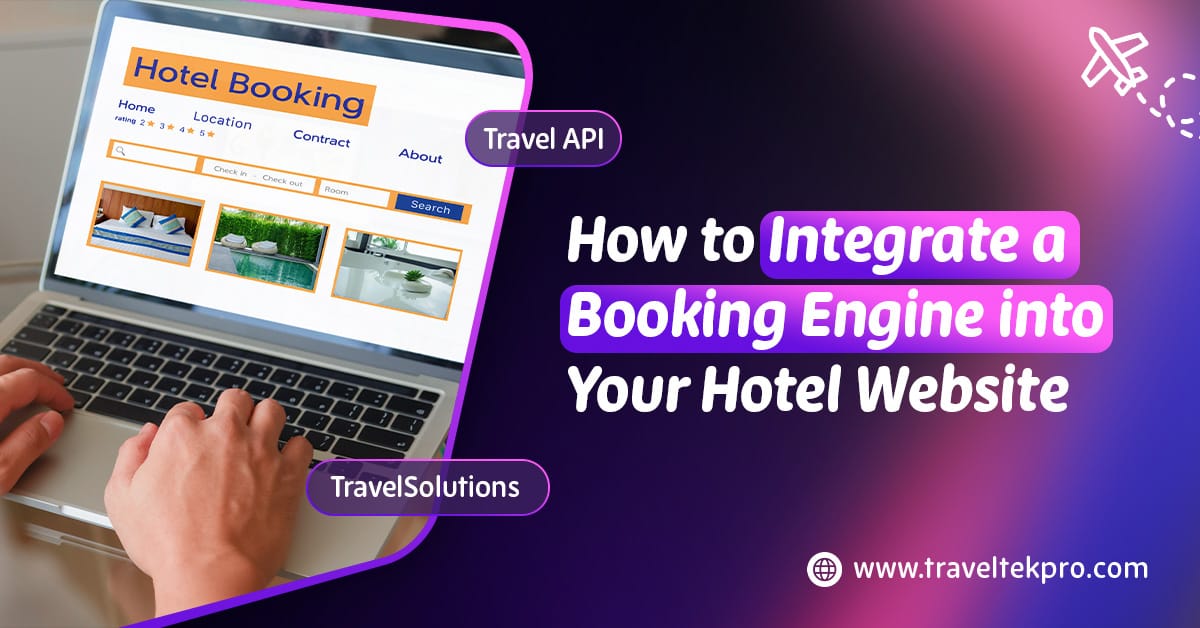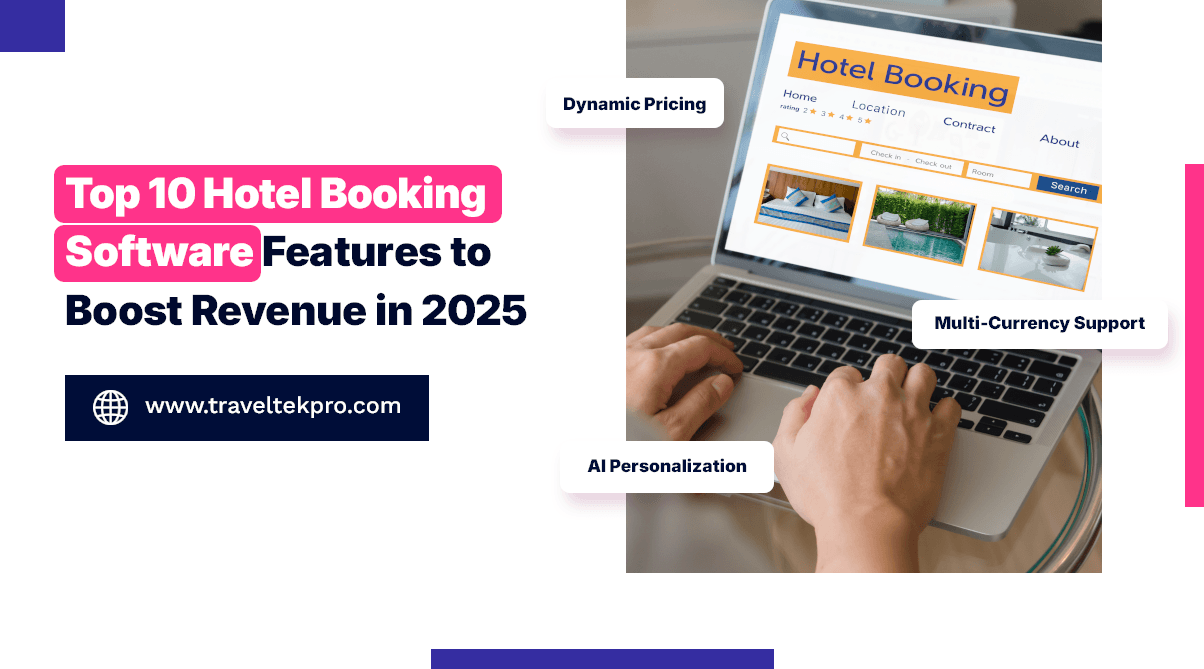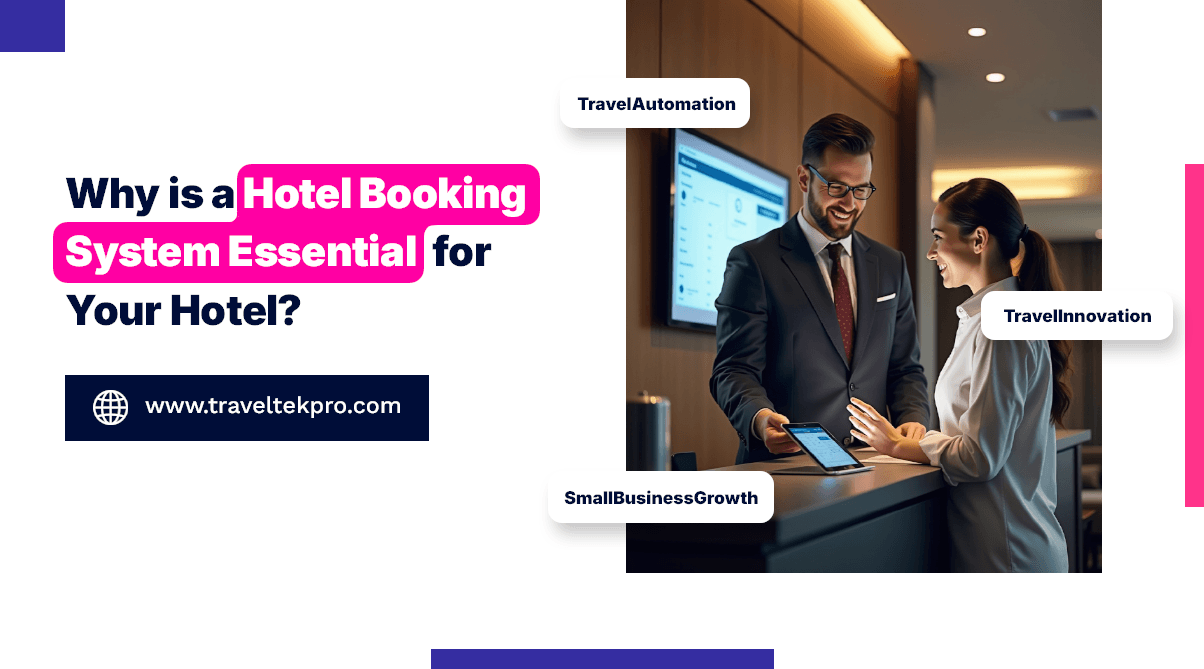How to Integrate a Booking Engine into Your Hotel Website
Running a hotel is different today from what it was 10 years ago. Today travellers are more tech savvy, most bookings are made online and competition is tougher than ever before. If your hotel doesn’t allow guests to book directly through your website you are losing out both on revenue and on guest relationships. This is where the hotel booking engine actually comes into the picture. It is a tool that allows visitors to your website to search for rooms, check availability, compare prices and confirm reservations instantly without having to call e-mail or go through an online travel agency. This makes life easier for your guests and also helps you reduce commissions paid to online travel agencies and take back control of your bookings. In this detailed guide you can learn everything about how to integrate booking engines in your hotel website.
Why do you need the best booking engine for hotels ?
A booking engine is actually a software that allows your guest to make reservations directly through your website. It displays real time availability and prices, takes secure payments and sends instant confirmations just like an OTA but under your control. Direct bookings means more profit. You avoid OTA commissions and keep more revenue. OTAs don’t always share full guest details but with the direct bookings you gain valuable data for your customized marketing. When your guests booked directly they trust your website and feel secure so you can expect brand loyalty. Furthermore you can run promotions, discounts or package deals exclusive to direct bookers.
A booking engine makes your website way more than just a brochure. Your guests can see real time availability and prices. They can book instantly without waiting for any confirmation emails. They can even choose add-ons like breakfast or airport transfers. The best part is that the guests can pay securely through integrated payment gateways. This convenience increases conversion rates turning casual browsers into confirmed guests.
Methods of integrating hotel booking engine
There are several ways to connect a hotel booking engine to your website. The right method depends on your hotel size and how much customization you want.
Widget based embedding
This is by far the most common and easiest method integration. You can just think of it like a plug and play to your website. Your booking engine provider gives you a small code snippet. You paste this onto your website where you want the booking option to appear. Or book now option calendar or booking form directly on your website will be seen. Guests don’t feel like they are leaving your website. It’s very quick to set up a little technical detail and also affordable and included in most booking engine plans. It’s perfect for you if you are a small hotel or a hostel. The widget design might look slightly different from your website so check branding consistency.
Redirect integration
Another popular method is to use a redirect integration. Instead of showing the booking form directly to your website you send your guests to a separate page to complete the reservation. Your book now button links to a booking page hosted on a sub domain or on your provider’s website. When they click a book now the page opens in a new window or redirects them to the booking portal. It’s very easy to implement with almost no coding. It’s great for you if you want to keep your main website simple.
The booking page is usually optimized for speed and mobile use. The guest leaves your main website which might feel less seamless. Branding customization might be limited unless your provider allows advanced styling. It’s perfect for you if you’re a medium sized hotel that wants simplicity but still a reliable booking flow.
Full API integration
If you want the most professional seamless integration API is the way to go. Developers use the best booking engine for hotels to integrate all booking functionalities directly into your hotel’s website. Your guests never feel like they’ve ever left your side. Your guests can just see a smooth branded booking experience that looks and feels like a part of your website. They can view the availability book and pay all within your website. It’s useful because you can get complete control over branding and design. But always ensure that you have web developers and experts who have technical expertise. It is more expensive to set up and maintain.
Technical considerations before integration
Before you choose your method it’s smart to check technical details. Firstly you must know that hotel booking engines do not work in isolation. It needs to connect smoothly with your hotel systems. If you skip this step you might face problems like double bookings missing payments or guest confusion.
1. Compatibility
Imagine your property management system as the back office brain of your hotel. It manages reservations and checkouts. If your booking engine doesn’t connect with your PMS you will need to manually transfer bookings, a recipe for errors.
2. Channel managers
Hotels often list rooms on multiple platforms, a channel manager will keep everything In Sync. When your guest books through your website the channel manager will update online travel agencies and other platforms instantly to prevent overbookings. Without this link you might have to manually close rooms on all the platforms every time you get a booking.
3. Content management system
Most hotel websites are built on WordPress. The booking engine should provide plugins or apps compatible with your CMS.
Two way synchronization
This is one of the most important features to check two way synchronization means if a room is booked on your website it disappears on the platforms instantly. If someone cancels the room automatically reopens for booking. Your rates, promotions and packages stay consistent elsewhere. Without two way sync you risk angry guests who arrive to find no room available and you will spend hours fixing errors manually. It’s very important for you to always choose the best booking engine for hotels like Traveltekpro.
1. Step by step guide to integrating hotel booking engine
Now that you know what to look out for, you need to understand the actual process.
Select the best booking engine for hotels
Choosing the right provider is the foundation. You can choose Cloudbeds that’s great for independent hotels or you can even choose Siteminder if you are a hotel that needs powerful channel management. It’s very important for you to look for free trials or demos before committing. The best booking engine for hotels is the one that fits your property size budget and system setup.
Set up your booking engine in the provider dashboard
Once you have chosen the best booking engine for hotels you will get access to an admin panel. Here you can add hotel details and set up rooms to define the base price and seasonal adjustments. Next you need to upload high quality photos. Furthermore you can think of this like stocking your hotel’s digital shop window.
Embed widget or redirect in your website
Your provider will guide you. If it’s a widget they will give you a code snippet to paste onto your website. If it’s redirected you will adjust easily as you just need to link your book now button to the booking portal. If you are a WordPress user then this will often take less than 10 minutes using a plugin. Always test it after embedding to see how it looks on your desktop and mobile.
Configure room types rates policies and add-ons
This step is about the details. You need to clearly define each room category with names and photos. Don’t forget to set cancellation and refund policies and offer extras like breakfast or half board spa packages or late checkout. Upselling through your booking engine is one of the easiest ways to increase your revenue.
Test live integration and synchronization
You should never launch without testing. You must make a dummy booking to ensure confirmation goes through. Check if the booking appears in your PMS automatically. You can even cancel and rebook to check if the sync works well this prevents any nasty surprises once your guests start booking.
Enable analytics and conversion tracking
Once your system is live connected to the analytics tools. Google Analytics can help you track clicks on the book now button. Google tag manager can set up conversion funnels to see where your guest drops off. Booking engine reports is where most providers offer dashboards to track occupancy and booking source. Without data, you will actually never know if a direct booking strategy is working.
2. Common integration challenges and how to solve them
Even if you follow all the steps, hiccups might happen.
1. Overbooking because of sync delays
This happens if the booking engine and OTAs don’t update fast enough. You need to choose a provider with strong two way sync and real time updates.
2. Slow loading widgets
Guests hate waiting. Google analyses slow pages, so you must compress images, test the widget load time and ask your provider about performance optimisation.
3. Mismatch in branding on mobile responsiveness
If your booking page looks completely different from your website, guests might even lose trust. Customize the booking engines fonts colors and logos. Always check mobile display as most bookings now come from smartphones.
Read More: Common problems with hotel booking engines and how to fix them
Best practices to optimize your booking engine for success
SEO enhancement metadata booking engine optimization
You need to optimize page titles with keywords like book direct at hotel name or use schema markup for hotel booking engines. It’s very important for you to ensure booking URLs are crawled by google.
Trust signals secure payment badges and book direct messaging
It’s very important for you to show SSL and payment badges and use book direct and save banners. It’s very important for you to add guarantees like free consultation or best price online.
Speed mobility usability conversion boosting design
Keep booking steps short as fewer clicks means more conversion. Use autofill for guest details and make buttons large and clear for your mobile users.
Tracking and measuring success
Your booking engine is a tool you need to track if it’s helping your hotel grow or not.
Google analytics events booking funnels goal tracking
You can set OTAs for button clicks, completed bookings and ignored carts. Use funnels to see at which step guests drop off.
How to choose the best booking engine for hotels?
Choosing the right hotel booking engine is one of the most important business decisions that you can ever make for your property. You can think of it like hiring a front desk manager who works 24/7 and never takes a break.
Booking engines typically follow one of the two pricing models like flat monthly fees you pay a fixed amount regardless of how many bookings you get. For small hotels a Commission based plan might be easier to start with as you just pay only when you earn. For larger hotels with many bookings a flat monthly fee usually saves money in the long run.
Your booking engine should be simple and intuitive for both you and your guests. The easier it is to use, the more bookings you can actually see and secure. A clunky system will drive guests away from 2 online travel agencies. Did you know that more than 70% of travelers today research and book hotels on their smartphones? If your booking engine does not look good or function properly on mobile you are losing out on a huge budget.
In short you must always choose a booking engine that grows with you. If you plan to expand your property, add new services or attract international guests then you would need a flexible engine that doesn’t lock yourself into a system that only works for your current needs.
So in short you need to know that a hotel booking engine is no longer optional, it’s essential. The best booking engine for hotels is the one that fits your property systems and budget. Connect with experts at Traveltekpro and learn more about integrating your hotel booking engine.
Read More: What is a Hotel Booking Engine and How Does It Work?
FAQ’S
1. Why should hotels integrate a booking engine on their website?
Hotels need a booking engine because it enables direct reservations, eliminates OTA commission fees, and builds stronger guest relationships. A booking engine turns a static hotel website into a 24/7 sales tool where guests can check availability, compare prices, and confirm bookings instantly. With real-time inventory and secure payment gateways, hotels gain more control over revenue and guest data for future marketing campaigns.
2. What is the difference between a booking engine and an OTA?
An OTA (Online Travel Agency) like Booking.com brings traffic but charges high commissions and limits guest data access, while a booking engine lets guests book directly on the hotel’s website under the hotel’s branding. Direct bookings give hotels more profit, flexibility for promotions, and loyalty opportunities, whereas OTAs provide visibility but less control. The most successful hotels balance both by integrating the best booking engine with a channel manager.
3. What are the best methods to integrate a hotel booking engine?
Hotels can integrate a booking engine using widget embedding, redirect integration, or full API integration. Widgets are quick and cost-effective, redirects work well for simplicity, while APIs provide seamless branding and advanced customization. The choice depends on property size, technical resources, and budget. Smaller hotels often use widgets, medium-sized ones prefer redirects, while large hotels benefit most from API integration.
4. How does a booking engine connect with hotel systems like PMS and channel managers?
A booking engine must integrate with a Property Management System (PMS) and channel manager to avoid overbookings and manual errors. PMS manages reservations and guest data, while channel managers sync room availability across OTAs and hotel websites. With two-way synchronization, every booking or cancellation updates instantly across all platforms, ensuring consistency and a smooth guest experience.
5. What features make the best booking engine for hotels in 2025?
The best booking engine in 2025 includes real-time availability, secure payments, upselling add-ons, mobile-first design, and advanced reporting. Features like multi-currency support, promo codes, SEO-friendly booking URLs, and integration with analytics tools help hotels maximize conversions. A strong booking engine should also offer flexibility, branding consistency, and integrations with global distribution systems to meet modern traveler expectations.
6. How can hotels optimize their booking engine for more direct bookings?
Hotels can boost direct bookings by optimizing booking engine design, improving speed, using trust badges, and promoting “Book Direct & Save” offers. Adding upsell options like breakfast or airport transfers increases revenue per booking. Hotels should also track conversions with Google Analytics, test user journeys, and ensure mobile responsiveness since most travelers now book via smartphones.
Let's Start Your Project
Let us help you achieve your goals, by creating the best solution for you!




